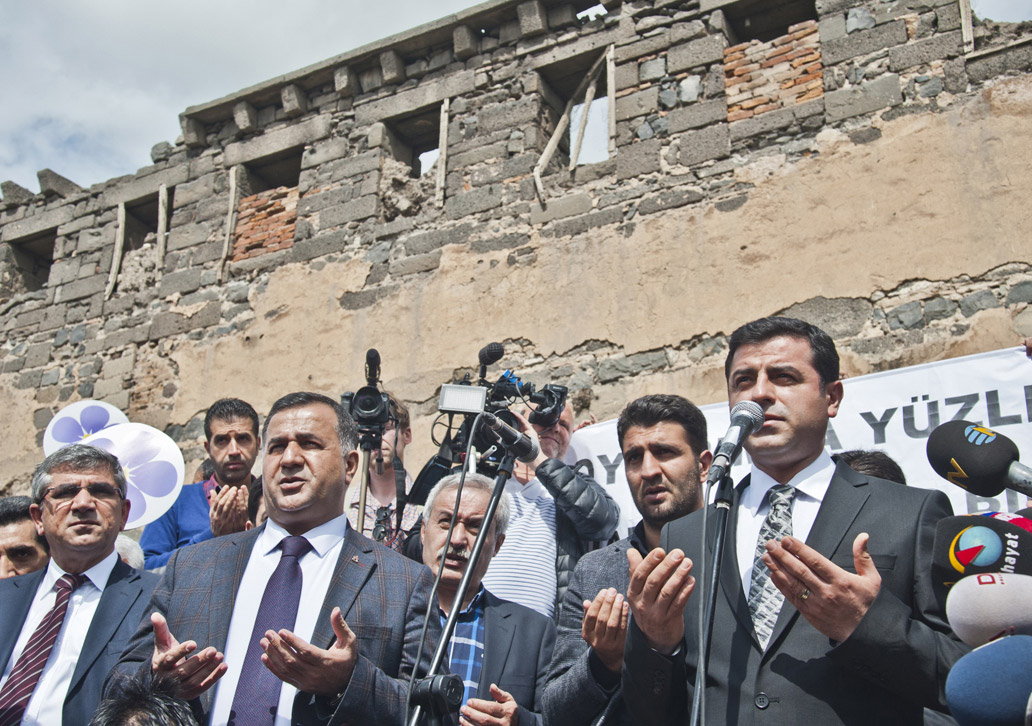A Process of Reconciliation : Kurds, Armenians, and Turks Discuss the Legacy of the Armenian Genocide
 20 September 2016
LONDON
(19 Sept. 2016): Last Monday, on 12 September 2016, the Gomidas
Institute and the Centre of Kurdish Progress hosted a special panel
discussion entitled "Armenians, Kurds and Turks: Towards a Peaceful
Resolution of a Painful Past.” The featured speakers were Hüseyin Olan
and Özcan Birlik, the mayors of Bitlis and Mutki respectively. They were
joined by Ara Sarafian (Gomidas Institute) and Tunç Albak (Middlesex
University). The gathering took place at the House of Lords under the
sponsorship of Lord Hylton, who also chaired the meeting and introduced
the speakers.
20 September 2016
LONDON
(19 Sept. 2016): Last Monday, on 12 September 2016, the Gomidas
Institute and the Centre of Kurdish Progress hosted a special panel
discussion entitled "Armenians, Kurds and Turks: Towards a Peaceful
Resolution of a Painful Past.” The featured speakers were Hüseyin Olan
and Özcan Birlik, the mayors of Bitlis and Mutki respectively. They were
joined by Ara Sarafian (Gomidas Institute) and Tunç Albak (Middlesex
University). The gathering took place at the House of Lords under the
sponsorship of Lord Hylton, who also chaired the meeting and introduced
the speakers.The first presentation was by Ara Sarafian, the executive-director of the Gomidas Institute. Sarafian began with a discussion of the changing political environment in Turkey between the 1980s and the present, and the possibilities of addressing Armenian issues – including the Genocide – during this period. He stated that, until the early 2000s, Armenian history was a taboo in Turkey because of official Ankara’s draconian laws and penalties. However, starting in the early 2000s, as Turkey opened up to the world, it allowed Armenian and Kurdish issues to be discussed publicly for the first time. During this period, Turkish authorities repeated much of their earlier position on the Armenians, including the official denial of the Armenian Genocide. However, it was at least possible to discuss alternative viewpoints.
Sarafian explained that it was in this period that the Gomidas Institute started to work with Turkish civil society organisations, most notably the Turkish Human Rights Association (IHD), but also public intellectuals, academics, lawyers, as well as the municipalities of Diyarbakir, Bitlis, and Mutki. The Institute’s activities included publishing books, organising exhibitions and conferences, as well as commemorating the Armenian Genocide. However, Sarafian noted that these positive developments were curtailed last year, as Turkey regressed into a more authoritarian, intolerant, and violent state.
The following speakers, Huseyin Olan and Ozcan Birlik, picked up where Sarafian left off and focused on the latest developments in Turkey. They stated that, while Armenians experienced a genocide 100 years ago, Kurds became the victims of another genocide in the following 100 years. Kurdish identity was suppressed for decades, as Turkey tried to forcefully assimilate Kurds as Turks. Many Kurds were murdered during this period, including in the Dersim Massacres of 1938. The mayors argued that the persecution of Kurds was the legacy of Turkish nationalism and the Armenian Genocide of 1915.
The mayors noted, as Sarafian did in his presentation, that the positive changes in the early 2000s gave hopes for a more democratic Turkey and a peaceful resolution of Turkey’s Kurdish issue. During this period, the Kurdish civil rights movement made significant progress, new Kurdish political parties were formed, and Turkey’s Kurds managed to elect their own MPs to the Turkish Parliament. However, it was against this backdrop that, a year ago, the President of Turkey, Recep Tayyip Erdogan and his party, the AKP, reverted to violence and intimidation to muffle Kurdish opinion. Indeed, only a few days before the panel discussion, Turkish authorities had ejected 28 elected Kurdish mayors from office, in addition to lifting the parliamentary immunities of Kurdish members of the Turkish Parliament.
The last speaker, Tunç Albak, gave a sobering paper on the theme of apology, focusing on the "non-apology” of President Erdogan in 2014, when he fudged the Armenian Genocide and presented a sham apology for the suffering of Armenians in 1915. Dr. Albak argued that Erdogan’s words were contrived and did not constitute an apology. He contrasted Erdogan’s stance to Kurdish politicians who have shown unqualified remorse for the destruction of Armenians in 1915, expressed their sorrow for Kurdish involvement in the Genocide, and conveyed their wish to pick up the pieces and make amends.
« Back